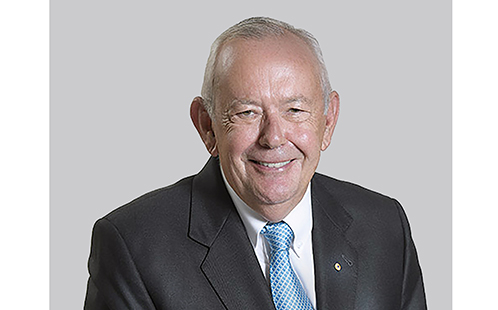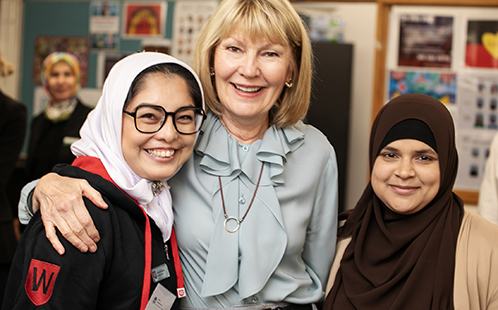Western Sydney University research success

Western Sydney University is delivering on its mission to produce research to improve people's lives and the wider community, with the announcement of over $5 million in Australian Research Council funding.
In the latest round of funding from the prestigious Australian Research Council, Western Sydney University was awarded 12 ARC Discovery Project grants.
The grants will help Western researchers conduct vital studies into topics as diverse as early literacy, Australia's changing manufacturing industry, and the nation's role in global financial networks.
In addition, three Western researchers were granted ARC Discovery Early Career Researcher Awards (DECRA) to help fast-track their promising research projects.
The DECRA funding will support research into areas of national significance including collateral damage in war, the human brain's response to music, and the impact of climate change on rainforests.
Deputy Vice-Chancellor (Research and Development) Professor Scott Holmes says the increase in funding is further evidence of the world class research at Western Sydney University.
The funding represents a 100 percent increase in the number of new discovery projects, and a $2.3 million increase on the last funding announcement.
"Western Sydney University is focused on using our knowledge to improve people's lives and help shape our nation's future," says Professor Scott Holmes.
"This funding validates our focus on research concentrations which deliver high-impact results.
"On behalf of the University I congratulate our researchers on their success and look forward to seeing the outcomes of their projects."
ARC Discovery Projects grants
Naming the world: early years literacy and sustainability learning
Professor Margaret Somerville, Centre for Educational Research ($278,038)
For children born in the 21st century, the enmeshing of natural and human forces in the survival of the planet requires conceptual and practical innovation. Early childhood education can be a fundamental driver in this process. This ambitious international study aims to integrate literacy and sustainability to produce powerful new learning for young children. It will theorise new forms of literacy emerging in sustainability education, articulate innovative pedagogies, and inform national and international policy and practice to address 21st century learning imperatives..
Graded K-theory as invariants for path algebras
Dr Roozbeh Hazrat, School of Computing, Engineering and Mathematics ($377,600)
Reconfiguring the enterprise: shifting manufacturing culture in Australia
Professor Katherine Gibson (Chief Investigator), Dr Stephen Healy, Institute for Culture and Society ($344,885)
Concerned with the wider societal and planetary impacts of business as usual, some innovative Australian manufacturers are reorienting their business towards social and environmental sustainability. The complexities involved in pursuing genuine sustainability in the enterprise call for shifts in the culture of manufacturing. This project uses qualitative research to explore the inner workings of twelve firms that are integrating different forms of sustainability into their core operations. The research develops business metrics and critical incident cases to unravel the negotiations involved in addressing social and environmental sustainability. In so doing, it contributes to debates about the nature of enterprise in the 21st century.
Will trees get enough nitrogen to sustain productivity in elevated CO2?
Professor David Ellsworth, Hawkesbury Institute for the Environment ($355,800)
Characterising controls of carbon flow from trees into mycorrhizal fungi
Professor Ian Anderson (Chief Investigator), Dr Jonathan Plett, Hawkesbury Institute for the Environment ($371,100)
A significant portion of plant photosynthate is shuttled to root-associated mutualistic ectomycorrhizal fungi in forest ecosystems. Therefore, fungal partners of forest trees are valuable carbon sinks. One significant problem impeding below-ground carbon accounting in forest soils is a lack of understanding concerning the genetic control of how photosynthetically fixed sugars are passed to root-associated microbes. This project will identify and characterise the sugar transporters that shuttle carbon in ectomycorrhizal plant:fungal interactions and investigate how these are affected by elevated levels of carbon dioxide. This will add a critical component to the global effort to understand the control of below-ground carbon sequestration.
Development of a novel mobile sensory system for bridge health monitoring
Dr Xinqun Zhu, School of Computing, Engineering and Mathematics ($225,000)
Bushfire-enhanced wind and its effects on buildings
Professor Kenny Kwok (Chief Investigator) Institute for Infrastructure and Engineering, Dr Yaping He, School of Engineering, Computing and Mathematics ($330,000)
Bushfire-enhanced winds have caused considerable property damage and loss of lives. This project aims to identify the mechanisms governing bushfire-wind interaction and determine the wind load effects on buildings due to bushfire-enhanced wind by garnering expertise in wind engineering and fire engineering and employing advanced computation techniques and unique fire-wind tunnel test facility. This knowledge will guide the development of improved building construction standards for bushfire-prone regions in Australia and the rest of the world to facilitate the design and construction of a new generation of bushfire-resistant buildings that safeguards lives and properties against the increasing threat of bushfire due to climate change.
Data Centres and the Governance of Labour and Territory
Professor Brett Neilson, Institute for Culture and Society ($433,790)
To grow or to store: Do plants hedge their bets?
Professor Belinda Medlyn (Chief Investigator), Dr Remko Duursma, Hawkesbury Institute for the Environment ($428,100)
This project aims to resolve a long-standing question about the function of perennial plants: how much of the carbon taken up by photosynthesis is used immediately for growth, and how much is kept in reserve as insurance against future stress? This question is fundamental to our understanding of how plants respond to stresses such as severe drought, and yet lack of data and theoretical modelling currently hampers our ability to answer it. By applying novel data analysis and modelling tools to recent experimental results, we will test alternative hypotheses for how plants allocate carbon between growth and storage in response to stress. Insights from the project will underpin better management of Australia's vulnerable ecosystems.
Mapping Print, Charting Enlightenment
Professor Simon Burrows, School of Humanities and Communication Arts ($459,606)
Australia's role in Global Financial and Production Networks
Professor Phillip O'Neill, School of Social Sciences and Psychology ($236,172)
Australia's long-term economic future is closely tied to providing financial services throughout Asia. Yet very little attention has been given to analysing the structures and networks that enable internationalisation, in particular the performance of Sydney and Melbourne as competitive financial centres within a network of financial centres in East and Southeast Asia. This project will examine the processes underpinning the growth of this network, map scenarios for the next two decades, and advise on policy implications arising from the 2013-14 Financial System Inquiry. It will be conducted by an expert international team using privileged access to specialist industry databases and intensive case study methods.
Modelling surface stresses in crystalline plates
Professor Yang Xiang, School of Computing, Engineering and Mathematics ($180,000)
ARC Discovery Early Career Researcher Awards (DECRA)
The invention of collateral damage and the changing moral economy of war
Dr Jessica Whyte, School of Humanities and Communication Arts ($346,434)
How musical rhythms entrain the human brain
Dr Sylvie Nozaradan, MARCS Institute ($373,536)
Entrainment to music is a culturally widespread activity that showcases the remarkable capacity of humans to synchronise to rhythmic inputs. Although such activity facilitates pro-social and therapeutic effects, the underlying brain mechanisms remain unknown. The proposed research will examine
the interface between musical rhythms, behaviour and brain activity using an original electrophysiological frequency-tagging approach that captures objectively the neural entrainment to rhythmic events. Results will provide important knowledge and novel insight into how psychological, environmental and
neural mechanisms affect such entrainment. This research will also inform practices for fostering education and clinical rehabilitation.
How will Australian rainforest species cope with climate warming?
Dr Kristine Crous, Hawkesbury Institute for the Environment ($379,500)
About ARC Discovery Projects grants
Discovery Projects grants are awarded to support excellent basic and applied research by researchers and teams to conduct research that expands Australia's knowledge base and research capability. These awards aim to encourage research and training in high-quality research environments and improve international collaboration so that the international competitiveness of Australian research is maintained.
About ARC Discovery Early Career Researcher Awards (DECRA)
DECRAs are awarded to promising early career researchers (ECRs) who have been awarded a PhD within five years, or longer if combined with periods of significant career interruption. The award gives ECRs an opportunity for diverse career pathways in both teaching and research, and research-only positions in high quality and supportive environments with a broadened aim to expand Australia's knowledge base and research capability across Australia.
Latest News

Western Sydney University receives transformational donation to support LGBTIQA+ community
Western Sydney University has welcomed a philanthropic donation from The Brennan Lynch Foundation.

Western Sydney University ranks among world’s best for 23 subjects
The University has been named as one of the world’s top universities for the study of 23 subjects in the latest edition of the QS World University Rankings by Subject, including being ranked in the top 50 for Nursing.

Western Sydney University receives landmark $7.9 million philanthropic gift from Harvey Norman to launch leadership academy, empowering young women in Western Sydney
Western has welcomed a landmark donation to establish the Harvey Norman® Young Women’s Leadership Academy Led by Katie Page.
Mobile options:

